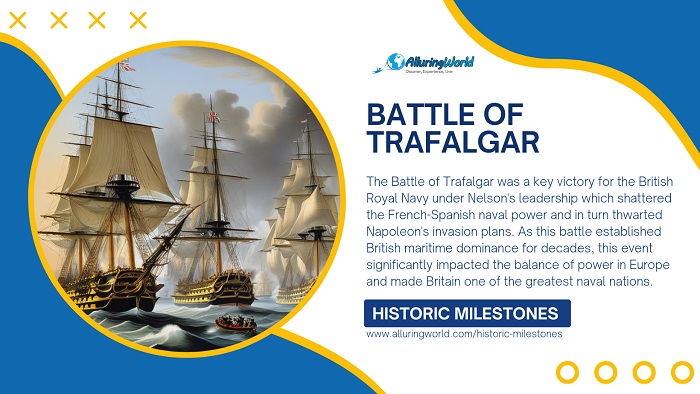Read time ca. 4 minutes
The Battle of Trafalgar which was fought on 21 October 1805, was a pivotal naval engagement during the Napoleonic Wars as this battle, which took place off the coast of Cape Trafalgar in Spain, saw the British Royal Navy that was under the command of Vice-Admiral Horatio Nelson, clash with the combined fleets of France and Spain, and the British victory at Trafalgar not only established British naval dominance but also significantly altered the course of European history.
The Prelude to Battle:
By the early 19th century, Napoleon Bonaparte had consolidated his power in France and harbored ambitions of continental dominance. Recognizing the vital role of sea power in achieving his goals, Napoleon sought to break the stranglehold of the British Royal Navy, and by controlling the La Manche Channel was paramount for a potential invasion of Britain which was a nation that posed a significant obstacle to his ambitions at that time. To this end, the combined French and Spanish fleets, under the command of Admiral Pierre-Charles Villeneuve, were tasked with a crucial mission that was to break the effective British naval blockade and gain supremacy in the La Manche Channel where this would pave the way for a cross-Channel invasion force to assemble and launch an assault on the British Isles.
In response to this growing threat, the British Royal Navy which was under the leadership of Admiral Lord Nelson, meticulously prepared to counter any French-Spanish naval maneuvers that were coming, so the Royal Navy had long maintained a superior naval force and a tradition of tactical innovation. Nelson, who was a renowned naval commander, recognized the strategic importance of the La Manche Channel and the potential consequences Britain would have upon a successful French-Spanish breakthrough, so he meticulously planned and executed a series of maneuvers to intercept and defeat the combined fleets which ultimately led to the decisive confrontation at Trafalgar in 1805.
The Battle Unfolds:
On the morning of 21st October 1805, Admiral Nelson boldly deviated from conventional naval warfare, and instead of the customary parallel line engagement which was common at the time, he divided his British fleet into two columns. These columns were led by Nelson and Vice-Admiral Collingwood and then they sailed perpendicularly towards the Franco-Spanish line. As this audacious maneuver was quite risky, it aimed to break through the enemy formation and to disrupt their command structure, so that it would create chaos within their ranks.
Through the fierce and very impactful battle, the end result of this unconventional attack was immediate and devastating because the British columns, bearing down on the enemy line at high speed, shattered the Franco-Spanish formation. This sudden disruption severely hampered the Franco-Spanish ships and their ability to coordinate their fire and maneuver effectively, and as the ensuing battle was fierce and chaotic, it was with individual ship-to-ship engagements dominating the scene. The British, with their superior gunnery and discipline, gradually gained the upper hand, inflicting heavy losses on the combined fleets.
Nelson’s Leadership and Sacrifice:
Nelson’s leadership was undeniably crucial to the British victory at Trafalgar since his innovative tactics that were a departure from traditional naval engagements, injected a crucial element of surprise and disruption into the battle. More importantly, Nelson’s charismatic presence and unwavering confidence inspired his captains and sailors, and despite facing a numerically superior enemy, the British fleet that was emboldened by their commander’s courage and strategic brilliance, fought with ferocious determination.
Tragically, this decisive victory came at a high personal cost because during the height of the battle, Nelson was fatally wounded by a French sniper, and though he lived long enough to learn of the British triumph, his death plunged the entire nation into mourning. Nevertheless, Nelson’s legacy transcended his tragic demise as he became a symbol of British naval supremacy and an enduring icon of national pride, his name forever etched in history as one of Britain’s greatest naval heroes.
The Aftermath and Significance:
The end result of the Battle of Trafalgar finished in a decisive and resounding victory for the British Royal Navy, and as the combined French and Spanish fleets suffered catastrophic losses, with over 20 ships captured or destroyed, on the other end, the British fleet emerged from the battle with relatively minor losses. This decisive defeat effectively shattered Napoleon’s hopes of invading Britain, as his plans hinged on gaining control of the La Manche Channel.
The resounding victory at Trafalgar cemented British naval supremacy for the next century and it demonstrated the unparalleled skill and discipline of the Royal Navy, while simultaneously crippling the naval power of France and Spain. This naval dominance played a crucial role in shaping Britain’s global influence and securing its position as a major power in the 19th century.
Conclusion:
In conclusion, the Battle of Trafalgar was a defining moment in the Napoleonic Wars which showcased the strategic brilliance and courageous leadership of Vice-Admiral Nelson, where the impact from this battle on naval warfare and European geopolitics was profound, shaping the balance of power for decades. The victory not only thwarted Napoleon’s ambitions but also reinforced Britain’s position as a dominant global maritime power, a legacy that endured well into the 19th century.

